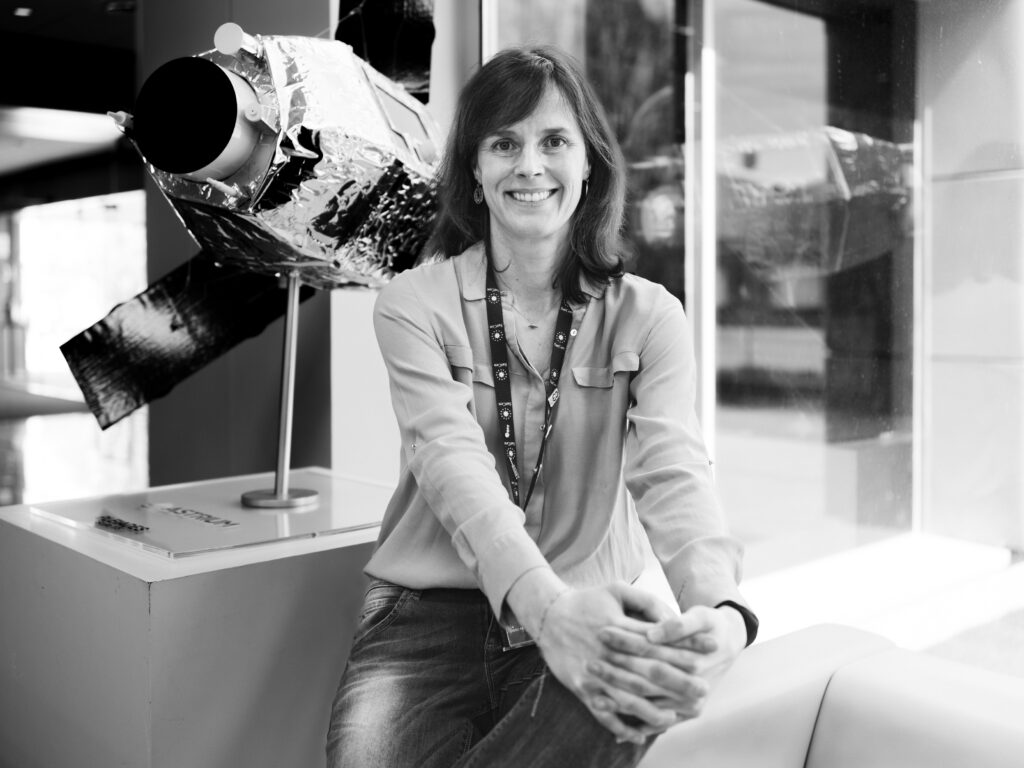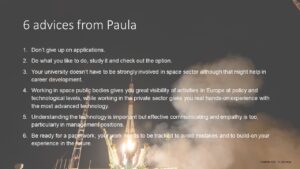The interview with Paula Saameno, Research, Technology Development and Innovation (RTDI) project manager at SatCen (European Union Satellite Centre) conducted by Kinga Gruszecka from POLSA. Paula is an engineer with thrive for understanding not obvious technology on her career path, daily tasks and space sector. In the interview, Paula also shares her views for career development.
Please introduce briefly yourself and the work you are currently doing?
My name is Paula. I’ve been working in the space industry 16 out of the 18,5 years that passed since I finished my Master’s degree in Telecommunication Engineering. Right after finishing, I had a very brief stage of 8 months in the mobile communications sector, followed by 2 years in the defence one, from which I moved to Space… and since then, here I am, in one position or another.
Nowadays I work as Research, Technology Development and Innovation Project Manager at SatCen, an EU agency working with space-based data, like optical and radar imagery, to develop new capacities to support decision-making processes relevant for the EU External Action and EU Member States.
For those that are not familiar with the European organizations’ ecosystems, a European agency is a public body that works for the benefit of Europe. In the Space domain, the most relevant ones are the European Union Space Programme Agency (EUSPA) and the European Space Agency (ESA), which work strongly together, but there are other benefiting from space assets. The Agency I work for is an operational one – working in the Space domain, but focusing on the exploitation of data to provide operational services related to security and safety.
What made you choose the “space” career path? When you decided to want to work in space sector?
I am captivated by technologies. I want to know how things that are not obvious work, and that is why I chose to study telecom engineering, to understand how the transmission of information was possible between remote ends. But I have always been fascinated by outer space as well, and by outer, I mean whatever is above the Earth and not reachable by foot. Thus, while I was studying at university I applied for a couple of internships in space, but my university was not one of the most popular in space, and I was not selected at that time.
Then, when I finished the degree, I started working in other sectors and forgot about space, but one day I saw an opportunity to work as Young Graduated Trainee at ESA and I applied… and I was lucky that time! Also, because I was able to reflect my know-how in the application thanks to the short experience acquired in the first non-space positions. I went to Noordwijk, in the Netherlands, where I worked for 2 years and that was an amazing experience, not only because I got a very good overview of the global space sector and acquired technical knowledge, but also because I discovered the European working environment. Therefore, this opportunity, even though could have been seen as a career regression (I moved from a job to a traineeship), opened the doors for a career in space.
From there I moved to the private sector to work in a company. In the space sector, generally, public bodies as Agencies or final users define their needs and the high-level requirements of a space mission, and then industry translate these into technical requirements and develop the hardware and software pieces. Thus, in private companies you can get hands-on experience in mission definition, design, and validation, which I consider very important to understanding how the complete space value chain works.
So, in summary, I did not choose to work in space in the first place, but the fact of keeping that possibility in mind kept me tuned to potential opportunities until I got one that I did take!
How did you find employment in your current job?
Sometimes it is difficult to get familiar with a sector, and the space one, I would say, is even more complex, as it had strong institutional involvement and, at the same time, space has a strong commercial component (e.g. telecommunication services), so an employment opportunity can come in many ways.
However, I found my current job by browsing the internet – though it took me some time to know where to look for it. That is, to know what types of employment opportunities exist (public, private, expert), what are the different profiles needed, which entities do what, which are the big and small players, who defines space missions, how are satellites used, etc.
And yes, I had to fill in several online formularies and write my CV a number of times, which is the boring part of the application process, but it is necessary, so do it with love, as it is the first entrance ticket to a job.
What are duties and responsibilities in your current role? How would you describe an ordinary day of work for you?
My current work has a strong focus on cooperation with other entities, as we are very active in research and innovation projects. I manage some of these projects and the job requires frequent teleconferences, discussions with partners about technical and programmatic activities and the elaboration of some key documents and deliverables depending on the project purpose.
What you find the most interesting or exciting when it comes to your role?
I love working in an EU environment. I like discovering what people in each country are doing in terms of space, the technological trends and how final users will exploit the technologies. This is possible in my role, and I like it very much.
Please describe your education path? What you find the most useful for being ready for work in the space sector?
To work in the space sector, the first thing to do is study something that is requested by the employers or the sector itself. There are many options: you can work in legal aspects, developing policies and managing legal contracts, you can work in financial roles, you can work on the definition of space missions and the use of data as a scientist, or in the implementation of the missions to satisfy the scientific requirements, or you can make up something new using space systems. Thus, it is important that you know what kind of work you want to do, and study something accordingly.
Another characteristic important to fulfill is to pay attention to the details and be patient. A space mission, from the idea to the launch of the satellite, can take about 10 years, so do not expect to have a fast-paced job, and be ready to do a lot of paperwork to document everything that you do or you discover, and to apply previous lessons learned.
In any case, this second aspect is valid for the traditional space sector, but it is evolving significantly in the last decades, and profiles are changing, increasing the demand for data scientists, ICT technicians and manufacturing engineers. Thus, I would say that the most important thing is to study something that you like and to check if this profile can fit in space.
What competences you find helpful in your role?
In my job, it is good to be either a scientist or an engineer, with relevant know-how in space systems. Equally important is to have strong management skills, which are not highly related to the qualifications (e.g. MBA or a Master’s in management), but more to the application of common sense. In my position, you need to work with a wide variety of people and profiles, as there are very different needs to be covered in a space project. Therefore, you need to have a clear mindset, knowing which are the real needs, and have adequate communication and human relationship skills to ensure successful interaction with all your colleagues, both internal and external.
In brief, I would say that a project management role requires empathy and, at the same time, strong organizational and communication skills. If you feel that you prefer to work in a well-defined area instead of putting together the physical and non-physical pieces of a project, it is possible that you would prefer a technical position, where collaboration is focused on the technological developments.
What are the strengths and challenges of the modern space sector that can encourage young people to direct their career plans in this direction?
Space sector strength is, to me, the concept of space itself, as it is something not tangible for most of us. It is exotic and with a huge potential for discovery.
Something that could refrain young people from entering the sector is the very slow pace for development and the high amount of paperwork associated. This is changing in the modern sector. Lots of public and private investment in space start-ups, as never seen before in space, are materializing and results are already starting to be public. So… it is the perfect timing for young, space-enthusiast, to start own journey in the sector. Young people are needed to come with fresh ideas, spread enthusiasm among well-experienced teams, and then do a critical assessment to identify, together, new business concepts and things that can be improved.
What advice you can share with high school students to help them in the career shaping or simply in professional life.
Do what you like now because you do not know what the future will bring! Twenty years ago, being a programmer was not very fancy and today they are the ones with more possibilities, so do not look at what the market is demanding now too much, because it can dramatically change.
Usually, doing what you like will take you somewhere that you will like, so do not overthink about decisions and make the one that your heart tells you.
If you want to work in space, do not give up. It might happen that you are not selected for the first 2, 3, 10 applications that you send, but you will finally succeed. Space is wider than it seems, and indeed, it is getting wider.

